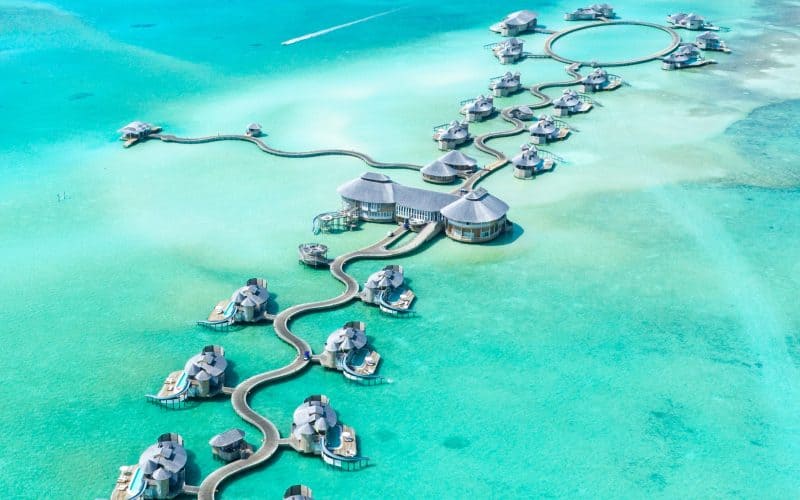
A renowned luxury resort in the Maldives is taking a pioneering approach to waste management with the introduction of its groundbreaking “Sustainability Lab.” CNN has learned that this facility, established by the Fairmont Maldives, Sirru Fen Fushi resort, offers guests a unique opportunity to witness firsthand one of the Maldives’ significant challenges – plastic waste.
Launched in early 2022, the Sustainability Lab is the first of its kind in the country. Housed in a building constructed from upcycled shipping containers near the resort’s arrival dock, it is equipped with specialized machinery capable of transforming plastic waste into custom-made souvenirs, furniture, and supplies for local schools. Additionally, the lab addresses the issue of discarded “ghost nets,” which pose a threat to sea turtles, by repurposing them into bracelets and luggage tags.
A visit to the Sustainability Lab reveals the magnitude of the plastic waste problem. Numerous bins filled with small plastic fragments of various colors are neatly arranged on shelves, awaiting processing in industrial machines. The predominant hue is blue, primarily due to an abundance of plastic water bottle tops.
Luxury hospitality sector increasingly interested in sustainability efforts
According to Samuel Dixon, a marine biologist and sustainability manager at the Fairmont Maldives, eco-conscious travelers, especially in the luxury hospitality sector, are increasingly interested in a resort’s sustainability efforts. Dixon, who has been overseeing the resort’s eco-inspired initiatives since its inception over five years ago, notes a growing number of guests engaging with and inquiring about various sustainability initiatives, such as coral restoration, turtle conservation, recycling, and renewable energy usage. He sees this trend as a positive sign that the hospitality industry is moving towards a more sustainable future.
The plastic processed at the lab is sourced from multiple places, including packaging from weekly food supplies, plastic waste from neighboring hotels and local schools, and debris collected from the sea. After thorough cleaning to remove dirt and residue, the plastic is shredded into small pellets for use in two ways. The extruder melts it down and molds it into 3D shapes to create souvenir turtles, carabiner hooks, and school rulers. The press flattens the plastic into sheets, which can be used similarly to wood. The resort’s carpentry team utilizes these sheets to craft furniture that guests can commission and have shipped to their homes.
While the amount of plastic processed at the lab is relatively small in the larger context, Dixon emphasizes the importance of raising awareness among visitors about the challenges faced by the Maldives. The resort also collaborates with local communities to tackle these issues. By bringing the Sustainability Lab to the forefront of guests’ experiences, Dixon believes it has a more significant impact than simply discussing recycling efforts.
Further steps to minimize plastic consumption
The Fairmont Maldives has taken further steps to minimize plastic consumption throughout the resort and make the hotel sector take sustainable actions. Plastic water bottles have been replaced with glass alternatives, and guests receive reusable water bottles to refill at water stations, which they can also take home as souvenirs. Additionally, the dental kits provided to guests feature toothpaste packaged in small paper packets.
Another conservation-focused attraction at the resort is the Coralarium, located a short distance offshore from the main beach area. This metal sculpture serves as a coral garden for local wildlife and is accessible to guests for snorkeling and exploration. Designed as an educational and conservation center, the Coralarium replicates a hard substrate of a coral reef, facilitating natural coral growth and acting as an artificial reef. It has attracted approximately 120 fish species, providing a visual demonstration of marine life to resort visitors.
The Secret Water Island
Nestled on the aptly named “Secret Water Island,” the Fairmont Maldives offers various accommodations, including overwater and beach villas of different sizes. The resort’s 9-kilometer house reef, housing over 400 species of marine life, lies just off the island and is easily accessible for snorkeling. The manta ray season, best observed between December and April, is a notable highlight for visitors.
In addition to its conservation-focused amenities, the Fairmont Maldives offers a range of treatments and therapies in its spacious spa, an array of water sports activities and excursions, and an exceptional kids’ club. The resort’s new Generation Sea program allows children to learn more about the resort’s conservation initiatives through visits to both the Sustainability Lab and the Coralarium.
Sustainability manager Samuel Dixon expresses pride in the resort’s accomplishments in creating a more sustainable environment and operations, as well as the positive response from guests of all ages who have taken an interest in previously neglected issues.
CNN acknowledges the Fairmont Maldives, Sirru Fen Fushi resort’s dedication to sustainable practices and its innovative approach to waste management, which sets a commendable example for the hospitality industry in the Maldives and beyond.
